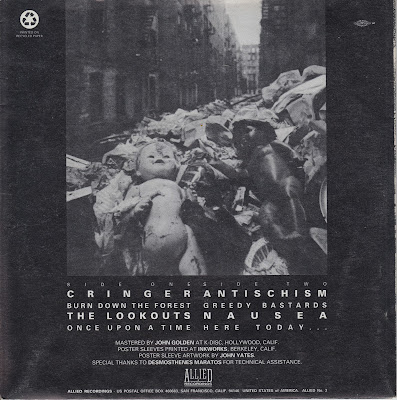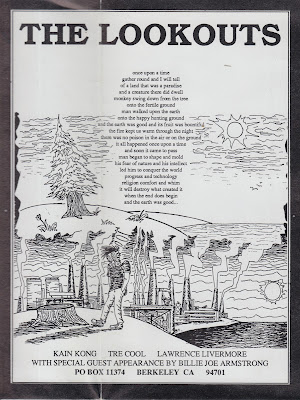"More songs about plants and trees" is objectively a good compilation. It gathered bands located at very different points on the punk spectrum around a common, worthy political cause. I love the idea because it illustrates the diversity in punk-rock but also the shared values, and in a time when we all cling to petty subgenres and artificial sub-scenes, it seems important to remember it. Besides, and even if it applies more to Lp's than Ep's, I like a little variety in my compilations. I often see them like punk festivals. I personally don't really enjoy monolithic festivals that only have one or two genres represented. As much as I love crust music, it quickly gets a bit tedious, if not boring, when the fifth Doom-like band starts playing. I much prefer festivals that display some variety in their programmes. It makes for a more diverse crowd and plenty of different punk expressions are celebrated. Granted, I may not watch the whole set of the Youth Crew band but at least it conveys the idea that, despite our aesthetic differences, we are on the same boat. Obviously, there also has to be a common political ground, otherwise any relevance is lost.
But back to this Ep that highlights diversity. It was the third release on Allied Recordings, John Yates' label. Although I am not a fan of everything he put out, one has to be impressed with the sheer variety of AR's discography (from Neurosis to J-Church, Political Asylum, Nausea, Wat Tyler, Buzzoven or Noam Chomsky!) and by his work as a visual artist throughout the years (a lot of Alternative Tentacles-related work of course but the full list of his contributions is truly stunning). You could say that the political meaning of punk has always driven John Yates' artistic choices and this early Allied Recordings Ep attests to that. The central theme of the compilation is the ongoing destruction of the rainforest for capitalistic gain and the the songs of the four bands included on the Ep deal with ecology.
Let's start with the challenging bit: the "melodic side". Now, I am a sucker for tuneful, anthemic punk-rock but let's say that I usually stick to the UK, Europe or even Latin America when I am craving for some, and hardly ever look to North America. Maybe the whole Californian punk-rock explosion of the mid-90's has left me wary of and prejudiced about the notion of "US melodic punk-rock". So let's try to give an honest look at the two bands of side A: Cringer and The Lookouts. I remember having a little argument (a misunderstanding really) with an American friend on a message board about the term "pop-punk" a few years ago. It was quite uneventful and amicable really, but we had very different notions of what "pop-punk" was meant to sound like. To me, it refers to Buzzcocks-influenced punk-rock, to the traditional Ulster punk sound or even to some of the 80's mod revival, basically bands that built on the pop tunefulness of 77 punk. I never really saw what was so poppy about Californian punk-rock, though it is melodic, but then, I never really dug deep into it.
From what I understand Cringer was a pre-J-Church band that was around in the second half of the 80's and formed in Hawaii before relocating to Los Angeles. Being a total stranger to both bands, I can't judge if "Burn down the forest" is a good Cringer song, especially since they have a consistent discography. What I hear is a tuneful and bouncy punk-rock song that is a little sloppily played but still works as a whole. It reminds me of Eastfield for the very upbeat tone and the vocals that are neither really sung nor spoken and borrow from American hardcore on that level.
I had vaguely heard of The Lookouts before listening to their song as this band that was related to Lookout Records and therefore to Green Day (yes, that Green Day). In fact, I realized that GD's drummer also played in The Lookouts, that The Lookouts' guitar player actually ran Lookout Records and that the song "Once upon a time" included on this Ep had a "special guest appearance by Billie Joe Armstrong". I never thought I would be talking about Green Day on Terminal Sound Nuisance but the punk world is a small interconnected one. I don't dislike Green Day to be honest, I have always thought that they had some brilliant tunes and proved to be smart songwriters, but that overall it wasn't bass-driven enough for me. The Lookouts' song is a mid-paced number, almost a punk ballad actually, that is not unpleasant, I like some of the ideas, but I feel the singing doesn't quite fit with the music. My own soundscape tells me that it is not unlike late Instigators, but I am sure there are more relevant points of comparison.
On the flip side are two of my all-time favourite US bands: Antischism and Nausea. "More songs about plans and trees" is a bit of a "Two rooms, two atmospheres" kind of pub. The fact that they are such classic bands don't make them any easier to describe, quite the contrary. As a matter of fact, I got my first Antischism and Nausea cd's (the Prank collection and the "Punk terrorist anthology vol 1" respectively) on the very same day, in 2003 (Discogs says 2004 for Nausea but they are wrong). I don't remember whom I ordered them from but I can still feel the excitement when I unwrap them. I knew next to nothing about both bands other than they were supposed to be "cult bands" that were often mentioned in the review sections of fanzines I was reading at the time. The only thing I actually knew from Nausea was the first minute of "Here today" that you could listen somewhere on the internet (it was the cd's first song and, ironically, also the one that appeared on our present compilation). I must have listened to this mere minute of music at least a dozen times in a row. Pure, unbeatable magic. As for Antischism, apart from the "classic band" tag, I picked them because the name really appealed to me since it was basically synonymous with "Antisect", a metaphor of unity and harmony. Cheesy, I know. I don't know if "antischism" was meant to be a reference to "antisect" but the meaning behind the monikers remains the same.
Antischism's song is "Greedy bastards" and it was recorded in september 1990 (another version of the song with Lyz singing appeared on the Lp). Recording dates are a bit blurry (there is no indication on the original records) but I would say that this song was recorded shortly after the "End of time" Ep. Antischism was a unique-sounding anarchopunk band with a very specific songwriting. The peculiar sound of the guitar and bass creates a fierce sonic landscape that blends surprisingly well with their brand of high-energy hardcore. The crucial factors of their music are urgency and intensity. The fast, manic drumming style combined with the breathless, desperate vocals gives the impression that the band's life was literally at stake (and even more impressive is the fact that the male vocals and the drumming were both done by Scott). There is an honesty, a genuine anger permeating the band's work that cannot be faked. Antischism remain difficult to aptly describe. I can hear some of Rudimentary Peni's demented sense of composition, the furious desperation of Italian hardcore like Negazione, possibly an influence from the Californian anarcho scene and bands like Crucifix or Final Conflict, and from a diachronic perspective, there is a definite hint of the rise of the super fast hardcore thrash of Hellnation and Dropdead. Truly breath-taking.
The final song of the compilation is "Here today" by the mighty Nausea. Much has been written about them and I suppose that most punks are at least partially familiar with the band's work. Again, I cannot be totally sure about the exact date the song was recorded, but my best bet is october 1990, probably during the same session as the "Cybergod" Ep. It was Nausea at their finest and I would not change a single thing to "Here today". The guitar is thick, powerful but keeps that filthy, rocking vibe; the distorted bass is groovier than a 70's disco party; the drumming is energetic, omnipresent but never distracting; and the vocals, foaming with rage, work perfectly together. Nausea at that time felt like a cohesive, unbreakable unit. "Here today" is a rocking anthem that takes the best of Discharge's bass lines, adds the smart riffing of late Antisect, Sacrilege and Hellbastard and tops it with genre-defining, dual male/female vocals. Genuinely, crushingly heavy but absolutely energetic and triumphant as well. I sometimes feel like the line "once fertile land now barren crust" can be read in a different way...
What an exhaustingly great side B this is...











No comments:
Post a Comment